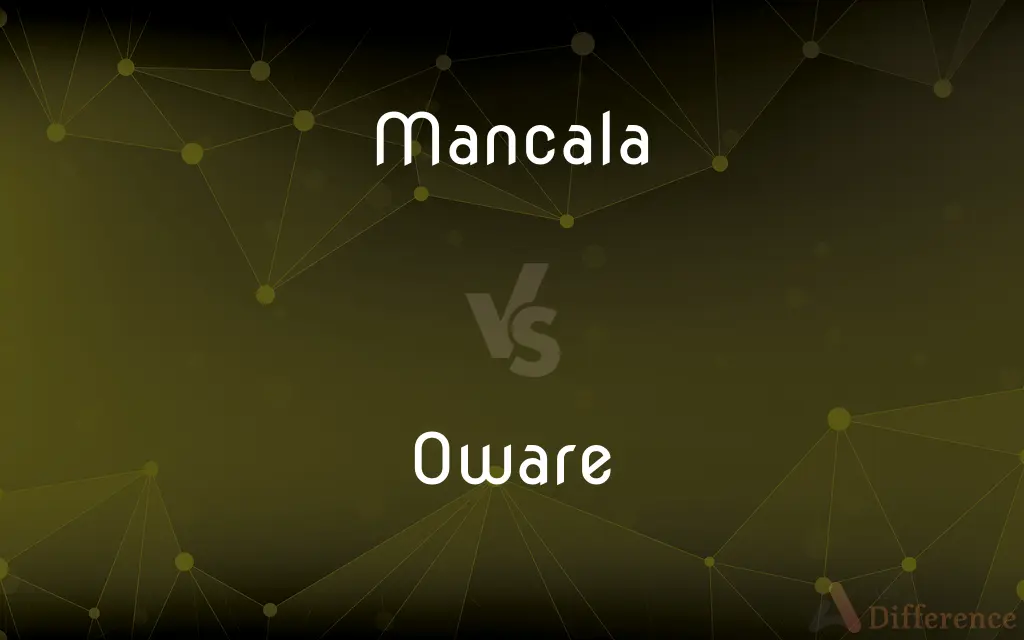Mancala vs. Oware — What's the Difference?
Edited by Tayyaba Rehman — By Fiza Rafique — Updated on April 27, 2024
Mancala is a broad family of board games involving stone capture, while Oware is a specific variation popular in West Africa, focusing on strategic seed sowing and capturing.

Difference Between Mancala and Oware
Table of Contents
ADVERTISEMENT
Key Differences
Mancala refers to a category of ancient board games played globally, where the general gameplay involves moving stones, beads, or seeds among pits on a board to capture them. Whereas Oware, a type of Mancala, is specifically known and played extensively across West Africa, and involves a distinct set of rules and strategies centered around sowing and capturing seeds.
In Mancala games, players scoop up all the pieces in one of their pits and, moving around the board, distribute them one by one in other pits. On the other hand, Oware's gameplay emphasizes not only the movement but also the strategic capture of seeds based on specific conditions, such as landing the last seed in a pit that brings the total seeds in an opponent’s pit to two or three.
The objective in most Mancala games is to capture more pieces than the opponent, which can involve various forms of counting and strategic placement. Whereas in Oware, the focus is more on directly capturing seeds from specific pits, which requires players to anticipate opponent moves and plan several steps ahead.
The board used in Mancala varies significantly in size and number of pits; it can range from simple wooden boards with two rows of pits to elaborate and decorative game sets. Whereas Oware traditionally uses a board with two rows of six pits, reflecting a more standardized approach to gameplay across different cultures where it is played.
While Mancala games can differ greatly in terms of rules and objectives depending on the region and specific game variation, Oware maintains a more consistent set of rules and is often used in educational contexts to teach mathematics and strategic thinking in parts of Africa.
ADVERTISEMENT
Comparison Chart
Origin
Ancient, multiple regions
Specifically West Africa
Gameplay
Variable, involves moving and capturing pieces
Involves sowing seeds and capturing based on specific counts
Objective
Generally to capture more pieces than the opponent
Capture seeds by ending moves with specific seed counts in pits
Board Design
Varies widely, from simple to elaborate
Consistently two rows of six pits
Cultural Significance
Diverse, with many regional variations
Deeply ingrained in West African culture with educational uses
Compare with Definitions
Mancala
The goal in many Mancala games is to capture more pieces than one's opponent.
He strategized to win Mancala by capturing the most stones.
Oware
Oware's gameplay involves sowing seeds and capturing them from specific pits.
In Oware, capturing occurs when the last sown seed lands in an opponent's pit with two or three seeds.
Mancala
Mancala refers to any game involving the movement of small objects (stones, seeds) in and out of pits on a board.
Mancala is played worldwide, with hundreds of variations.
Oware
Oware is a traditional African Mancala game focused on strategic seed capture.
Oware is considered the national game of Ghana.
Mancala
Mancala boards can vary greatly, typically featuring rows of pits.
Mancala boards are often made of wood and beautifully carved.
Oware
Oware is particularly noted for its cultural and educational value in Africa.
Oware is often used to help children understand mathematics.
Mancala
Mancala games are part of educational curricula in various countries.
Mancala is used to teach counting and strategic thinking in schools.
Oware
The Oware board consists of two rows of six pits each.
Each player in Oware controls one row of six pits.
Mancala
Mancala is known for its simplicity and depth of strategy.
Mancala is easy to learn but challenging to master.
Oware
Oware tournaments are popular in many African countries.
He participated in an Oware championship in Nigeria.
Mancala
Mancala is a generic name for a family of two-player turn-based strategy board games played with small stones, beans, or seeds and rows of holes or pits in the earth, a board or other playing surface. The objective is usually to capture all or some set of the opponent's pieces.
Oware
Oware is an abstract strategy game among the Mancala family of board games (pit and pebble games) played worldwide with slight variations as to the layout of the game, number of players and strategy of play. Its origin is uncertain but it is widely believed to be of Ashanti origin.Played in the Bono Region, Bono East Region, Ahafo Region, Central Region, Western Region, Eastern Region, Ashanti Region of Ghana and throughout the Caribbean, Oware and its variants have many names - Ayò, Ayoayo (Yoruba), Awalé (Ivory Coast, Benin), Wari (Mali), Ouri, Ouril or Uril (Cape Verde), Warri (Caribbean) Pallanguzhi (India) Wali (Dagbani), Adji (Ewe), Nchọ/Ókwè (Igbo), ise (Edo), Awale in (Ga) meaning Spoons in English according to the Ga name for the game.
Mancala
(board games) Any of various board games, common throughout Africa and Asia, in which a move consists of emptying a pit and then its contents are sown one by one into ensuing pits.
Oware
(games) A board game of the mancala family which originated in Africa, and is reputedly the oldest game in the world.
Common Curiosities
What is Oware?
Oware is a type of Mancala game that involves sowing and capturing seeds according to specific rules.
What is Mancala?
Mancala is a family of board games where players move pieces around a board to capture them.
Is Oware played competitively?
Yes, Oware has competitive scenes, especially in West Africa, where tournaments are held.
What are the typical materials for Mancala boards?
Mancala boards are made from various materials, including wood and stone, and can be highly decorative.
Are there digital versions of Mancala and Oware?
Yes, both games are available in digital formats for different platforms.
How many types of Mancala games exist?
There are hundreds of Mancala variations worldwide, each with unique rules and objectives.
How is Oware played?
Players distribute seeds in pits across the board, capturing them by ending a move in specific conditions.
What skills does playing Mancala develop?
Mancala games develop counting, strategic thinking, and planning skills.
Can Mancala and Oware be played by two people?
Yes, both games are typically designed for two players.
How long does a typical game of Mancala last?
Game length can vary, but most Mancala games last between 15 to 30 minutes.
What is the significance of Oware in African culture?
Oware holds a significant cultural and educational role, particularly in West Africa.
How is Oware different from other Mancala games?
Oware's specific rules about sowing and capturing seeds distinguish it from other Mancala variants.
Are there age restrictions for playing Mancala or Oware?
Both games are family-friendly and suitable for all ages.
What is the best strategy for winning at Oware?
Effective strategies involve planning several moves ahead and anticipating opponent actions.
How long does a game of Oware typically take?
Oware games usually take about the same time, though competitive games may last longer.
Share Your Discovery

Previous Comparison
Buyer vs. Vendor
Next Comparison
Assay vs. PurityAuthor Spotlight
Written by
Fiza RafiqueFiza Rafique is a skilled content writer at AskDifference.com, where she meticulously refines and enhances written pieces. Drawing from her vast editorial expertise, Fiza ensures clarity, accuracy, and precision in every article. Passionate about language, she continually seeks to elevate the quality of content for readers worldwide.
Edited by
Tayyaba RehmanTayyaba Rehman is a distinguished writer, currently serving as a primary contributor to askdifference.com. As a researcher in semantics and etymology, Tayyaba's passion for the complexity of languages and their distinctions has found a perfect home on the platform. Tayyaba delves into the intricacies of language, distinguishing between commonly confused words and phrases, thereby providing clarity for readers worldwide.
















































